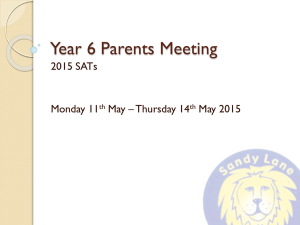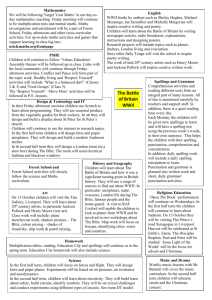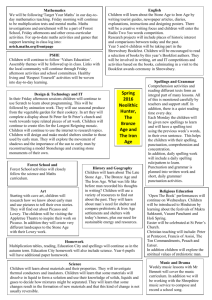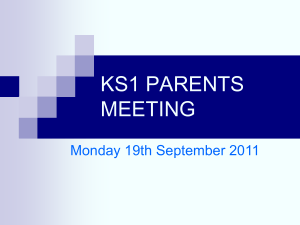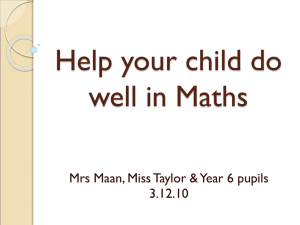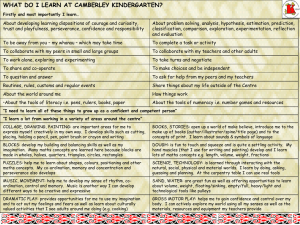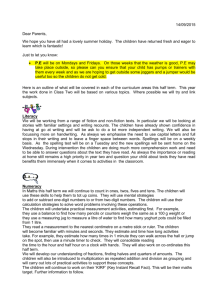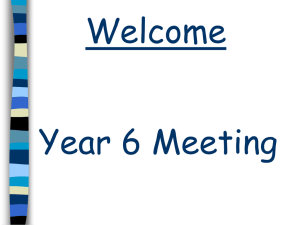Year 5 and 6 information evening 2014
advertisement
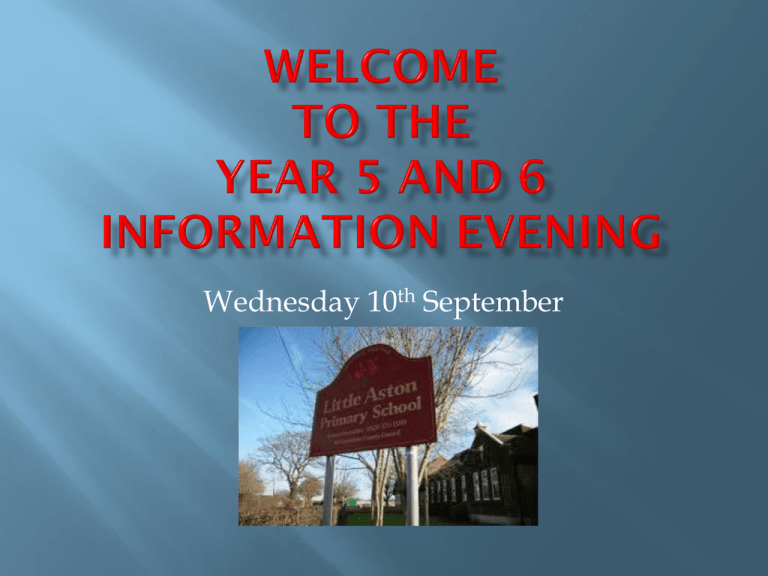
Wednesday 10th September However, you can find this entire presentation on the Year 5 and Year 6 School Site on the Launch Pad (Demonstration of how to find class messages / homework through child’s log in) http://la.lp365.co.uk Other important information thorough http://www.littleaston.staffs.sch.uk/the School Website Children succeed when schools and parents work together! Parental support and input is crucial. Clear, open lines of communication between school and parents are essential Lessons start at 9.05 am, so please ensure children are in school for registration from 8:45am-9am. Break is at 10.05 -10.20 Lunch is 12.30 to 1.30. The day ends at 3:30pm. A revised national curriculum from 2014 for all maintained schools No more assessment levels (except for Y2 & Y6) Each school is responsible for publishing its curriculum and assessment framework Year 5 will be working from this new curriculum Year 6 will interweave both old and new as SATs in May will be testing old curriculum. KS2 tests for reading, maths, grammar. Teacher assessment for writing and science KS2 reading – 3 pieces of text in ascending order of difficulty; children have 1 hour for reading and answering questions, rather than split 15 mins reading/45 minute questions KS2 maths – no calculators allowed in L3-5 tests Is working towards… Has met the expected standard for year… Has exceeded… Rewards and sanctions The Merit system Detention Child of the Week Reading rewards Times tables rewards Exploring a range of texts Poetry, Non fiction and Fiction New interactive resource – exciting texts Skellig by David Almond… Many different book covers!! (Make sure you don’t buy the French version or the Play script!) Some of our other Literacy work will be centred around reading this book If possible please could you buy this for your child asap (it is available for around £5 on Amazon). Reading Reading is absolutely vital! With so many other temptations, for example the lure of the X box or Play station, it is easy for reading to be overlooked! We will do plenty of reading in school. There will be focussed, small group Guided reading lessons throughout the week. But reading in school alone is not enough! All children should be encouraged to read at home – preferably daily. All children in Y5 and Y6 will have a reading journal. This should be filled in each time a child reads, with the date, name of the book, number of pages read and any comments you have to make about your child’s reading performance (eg fluency, understanding of what they have read etc). While it is not absolutely necessary for a parent to read with their child in Y5 and Y6, it IS important that you check your child’s understanding of what they have read! We ask that you encourage your child to choose books from a variety of genres and listen to them read at home where possible. In Y5 and Y6 children need to show a deep understanding of the texts they read; the ability to sight read isn’t enough, they must be able to apply the skills of inference and deduction. Wide range of e-books on Launch Pad RMBooks Maths Year 6 are working in their own class for maths. In Year 5 there are two groups, one with Mrs Bamber and another group working with Mrs Bailey & Mrs Parry. We anticipate some movement between the groups as the year progresses. The New Curriculum has raised the bar significantly in this subject! The early part of the Autumn term will be spent ensuring children understand the number system (place value) and then reinforcing and learning mental and written strategies for the four main methods of calculation (addition, subtraction, division and multiplication). We will cover the following units: * Counting, partitioning and calculating. * Securing number facts, understanding shape. * Statistics and measures. * Calculating, measuring and understanding shape. Maths It is vital that your child is able to recall all their times table facts as they provide the foundation of many aspects of their Numeracy syllabus. We will be carrying out weekly ‘Turbo’ tables tests once the term is fully up and running, with certificates awarded to those who successfully complete each level in the fastest times. Maths There is another fabulous website which is great for improving a child’s mental maths skills. It is www.tutpup.com – free to sign up and you take on children from all over the world to add an element of competitive fun! Also try: honorpoint.com mymaths learningtables.co.uk iamlearning acitvelearnprimary.co.uk I have uploaded onto the Y6 interest space a list of SAT-style revision guides and question books which have proved extremely successful over the past two years! Maths You can help your child without having to work too hard! In the car – ask them a few quick fire times table questions. Going shopping? Ask your child to add up the cost of different items in their head! How much change will we get if…..? History Y5 will be taking a trip back to one of the most fascinating civilisations in history to discover Ancient Greece and all it has to offer. We will be focusing on people, the inventions, the art, the technology and the mythology. Y6 meanwhile will be studying a new topic, the history of Crime and Punishment in Britain – from ducking stools to some of the more macabre forms of capital punishment! Science Both Year 5 and Year 6 will be starting by looking at All Living Things. Y5 we will be learning to explain the differences in the life cycles of a mammal, an amphibian, an insect and a bird describe the life process of reproduction in some plants and animals. Year 6 will be taking a close look at how all living things are placed into categories by scientists (invertebrates/vertebrates – mammals, reptiles etc). Year 6 will also be covering a major topic on Health Education. PE Children will be taught PE mainly by Mr Tennant as the school’s PE and Games Co-ordinator. For Year 5 PE takes place on Monday and Tuesday afternoon. For Year 6 it is Tuesday and Friday afternoon. There will be a strong emphasis on team games and throughout the year children will be taught skills in football, rugby, hockey, cricket, rounders and hopefully basketball. There will also be some golf! We also play a lot of dodge ball. Aston Villa’s community coach Jon Bayliss will be returning after half-term to lead curriculum-time football coaching. The indoor lessons will focus mainly on gymnastics and dance. We also have a coach working alongside our teaching staff this year to help us improve the quality of our PE and Sport provision. There are more after school clubs and more lunchtime sporting activities as we try to educate our children to be healthy. PE Please ensure that the children have the appropriate kit with them on PE days. Standards of dress slipped last year with children not having pumps or trainers and trying to wear school shoes for games. This is neither safe, healthy or acceptable. Children who don’t have a good reason for not wearing the correct kit may find themselves not taking part. If you are in any doubt about what your child should be wearing, please ask at the office. Homework We do not believe in over-burdening children (and parents) with homework! Homework will be set either to reinforce learning from the previous week or to research a topic coming up in the next week. We will sometimes ask the children to complete a larger project for homework, which will be set over a period of weeks rather than days. They will have the opportunity to present their final product in a variety of ways. Spellings Children in each year group follow a spelling programme. Children will be taught basic spelling patterns in short, focussed lessons of around 10-15 minute duration. Spelling tests will take place on a Friday morning. Spellings to learn at home for next week’s test will be given out at the same time . Children will copy the list of spellings into their spelling book and will then be expected to use the Look, Say, Cover, Write and Check method in order to learn them. Obviously, if you can work with your child to help them learn their spellings they have an even greater chance of being successful! Don’t forget there are spelling help books available if your child really struggles in this area too! Laches Wood This year’s residential trip will once again be to Laches Wood, which is a few miles north of Wolverhampton. Note for diaries: This year’s trip will take place from Monday 8th December to Friday 12th December (pack your thermals!). There will be a parents meeting in November at which further details of the trip will be given. Y6 SATS Will take place in the week beginning Monday 11th May Please do not book holidays! Children will be tested in maths (two papers) plus a mental maths test). Children will take a reading comprehension test. Children will sit the grammar test. As was the case last year, writing will be teacher assessed throughout the year. Some more able children will be entered for the level 6 tests. The tests are VERY demanding! Have a look yourselves! E-safety As a school and as parents, we all have a responsibility to ensure our children are safe online… • Cyberbullying in the news • Incidents involving children at Little Aston As parents and teachers, we therefore have an important role to play in helping children and young people stay safe online and encouraging safe and responsible use of the technologies WHAT ARE THE DANGERS FOR OUR CHILDREN? New technologies offer tremendous opportunities for children however there are also risks including: cyberbullying grooming potential abuse by online predators exposure to inappropriate content including self-harm racism adult pornography. Some of these risks can be a continuation of the risks children and young people experience offline. However, they can be increased because many children and young people also fail to realise that the internet is a public place. Instant messaging BLOGS Music Download sites Gaming sites Wikis Video broadcasting Mobile phones E-mail Social networking Chat Rooms Text / SMS WHAT ARE THE DANGERS FOR OUR CHILDREN? Biggest danger is the not knowing – 26% of parents don’t know how to check website history 65% of young people can clear internet history 1% of parents thought their child blogged 33% of children used blogs 67% of parents didn’t know what a blog was 33% of children have met a ‘friend’ online 8% have had a face-to-face meeting with an online friend 89% told someone they were doing so UK Children Go Online, 2005, 9-19 year olds Usage and experiences are often not reported to parents/teachers as they fear the withdrawal of access Are our children and young people aware of the risks? Who/what can help? CEOP works across the UK and maximises international links provides internet safety advice for parents and carers report facility enabling anyone to report any inappropriate or potentially illegal activity with or towards a child online Who/what can help? Education in school What are the key things we teach the children in school? • keep your username (where possible) and password PRIVATE • save any messages that have upset you so you can show them to someone who can help • do not give out any personal details such as your full name, address etc. • if you see anything on-line that concerns you tell a trusted adult What are the key things we teach the children in school? • never send photographs or videos to people that you don’t know in the real world • never arrange to meet anyone in real life that you have met on-line • show respect to others on-line • never open emails from people you don’t know Who/what can help? Parental support Know what your children are doing online and who they are talking to. Ask them to teach you to use any applications you have never used. Help your children to understand that they should never give out personal details to online friends — personal information includes their messenger id, email address, mobile number and any pictures of themselves, their family or friends— if your child publishes a picture or video online— anyone can change it or share it. If your child receives spam / junk email & texts, remind them never to believe them, reply to them or use them. It's not a good idea for your child to open files that are from people they don't know. They won't know what they contain—it could be a virus, or worse - an inappropriate image or film. SAFETY IDEAS PARENTS SafetyFOR Ideas Help your child to understand that some people lie online and that therefore it's better to keep online mates online. They should never meet up with any strangers without an adult they trust. Teach young people how to block someone online and report them if they feel uncomfortable. There are people who can help. ThinkuKnow www.staffsscb.org.uk www.wmnet.org.uk http://www.getnetwise.org/ http://www.childnet-int.org/ (Know it all) http://www.bbc.co.uk/webwise/ www.ceop.gov.uk ‘..the risks do not merit a ‘However, the risks are nonetheless moral panic, and nor do they widespread, they are experienced by warrant seriously restricting many children as worrying or children’s internet use problematic, and they do warrant because this would deny serious intervention by government, them the many benefits of the educators, industry and parents.’ internet. Indeed, there are real costs to lacking internet http://www.children-goaccess or sufficient skills to online.net/ use it.’ Parents morning On Friday 5th December parents are invited to come into the classroom and spend time with their children, look through books and chat to teachers. Both of us are usually available after school if you would like a brief chat. Or if you would like a longer appointment after school get in contact with either of us, or the office, and we happily arrange a date and time. Many thanks for coming Any questions??
